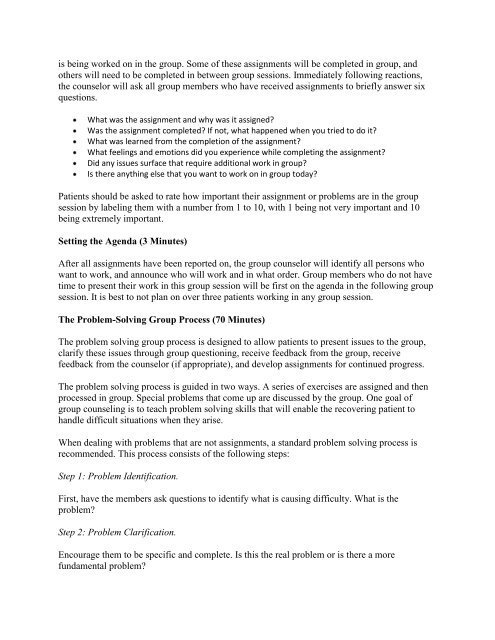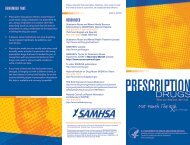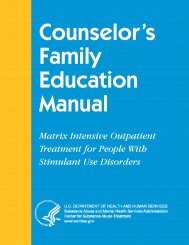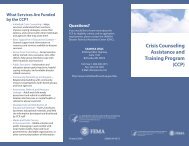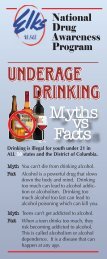Counselor's Manual for Relapse Prevention With Chemically ...
Counselor's Manual for Relapse Prevention With Chemically ...
Counselor's Manual for Relapse Prevention With Chemically ...
You also want an ePaper? Increase the reach of your titles
YUMPU automatically turns print PDFs into web optimized ePapers that Google loves.
is being worked on in the group. Some of these assignments will be completed in group, andothers will need to be completed in between group sessions. Immediately following reactions,the counselor will ask all group members who have received assignments to briefly answer sixquestions.What was the assignment and why was it assigned?Was the assignment completed? If not, what happened when you tried to do it?What was learned from the completion of the assignment?What feelings and emotions did you experience while completing the assignment?Did any issues surface that require additional work in group?Is there anything else that you want to work on in group today?Patients should be asked to rate how important their assignment or problems are in the groupsession by labeling them with a number from 1 to 10, with 1 being not very important and 10being extremely important.Setting the Agenda (3 Minutes)After all assignments have been reported on, the group counselor will identify all persons whowant to work, and announce who will work and in what order. Group members who do not havetime to present their work in this group session will be first on the agenda in the following groupsession. It is best to not plan on over three patients working in any group session.The Problem-Solving Group Process (70 Minutes)The problem solving group process is designed to allow patients to present issues to the group,clarify these issues through group questioning, receive feedback from the group, receivefeedback from the counselor (if appropriate), and develop assignments <strong>for</strong> continued progress.The problem solving process is guided in two ways. A series of exercises are assigned and thenprocessed in group. Special problems that come up are discussed by the group. One goal ofgroup counseling is to teach problem solving skills that will enable the recovering patient tohandle difficult situations when they arise.When dealing with problems that are not assignments, a standard problem solving process isrecommended. This process consists of the following steps:Step 1: Problem Identification.First, have the members ask questions to identify what is causing difficulty. What is theproblem?Step 2: Problem Clarification.Encourage them to be specific and complete. Is this the real problem or is there a morefundamental problem?


